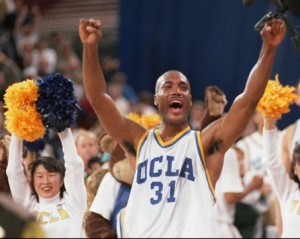(ThyBlackMan.com) Why athletes need to demand a piece of the money they earn…
I’ve said it once and I’ll keep on saying it: The NCAA is an incredibly destructive force within the African American community. The league, which professes to offer opportunities to “educate” players, often turns into a pathway to broken dreams, empty bank accounts, prison sentences and even suicide. The stories involving former University of Kentucky stars Melvin Turpin and Antoine Walker are very good cases in point. Turner recently committed suicide and Walker is on his way to prison for gambling debts.
The goal here is not to focus specifically on the cases of Walker and Turner, but to instead talk about why the NCAA has so much power over athletes  and how athletes might find a way to change that. Significant limitations on athlete labor rights have been allowed by Congress, and they tend to be most strict on athletes in revenue generating sports. Nearly every activity and revenue stream of the athlete is carefully controlled, with the sole objective of keeping money in the pockets of old white guys. The racial element to this clearly unjust and unAmerican way of doing business cannot be denied. One has to wonder if the fact that most of the top college athletes are black plays a role in why the public perceives the NCAA to be helping the athletes, the same way a major corporation is considered to be a savior for five-year olds in a Chinese sweatshop.
and how athletes might find a way to change that. Significant limitations on athlete labor rights have been allowed by Congress, and they tend to be most strict on athletes in revenue generating sports. Nearly every activity and revenue stream of the athlete is carefully controlled, with the sole objective of keeping money in the pockets of old white guys. The racial element to this clearly unjust and unAmerican way of doing business cannot be denied. One has to wonder if the fact that most of the top college athletes are black plays a role in why the public perceives the NCAA to be helping the athletes, the same way a major corporation is considered to be a savior for five-year olds in a Chinese sweatshop.
The problems with the NCAA are quite clear: Athletes and their families are kept away from the massive revenue streams created by their labor, and they almost never get a chance to earn any part of the extravagant wealth created by young black males in these sports. For example, the recent 14-year, $10.8 billion TV rights deal signed by the NCAA would not be possible had it not been for the labor of college athletes. Most fans don’t turn on the TV to see a coach or administrator, yet these are the individuals who end up pocketing the cash. When athletes are done playing, they are almost never invited to rejoin these campuses as coaches or athletic directors, since the NCAA perceives their value to have diminished with their athletic skills.
The road to redemption for college athletes is the court of law. By challenging the anti-trust exemptions afforded to the NCAA, athletes can find a way to get a piece of the money they are earning. While many argue that athletes are able to get a return on their investment by playing in the NBA or NFL, this assumption is refuted by the fact that only a small percentage of college athletes ever get a chance to play professional sports. Also, many of the athletes who find their way to the pros don’t usually last very long.
The class action lawsuit filed by former college athlete Ed O’Bannon is a great opportunity for players and their families to finally get some of the revenue they deserve. A team of attorneys is working with O’Bannon to hold the NCAA accountable for its unauthorized use of player images on video games. This lawsuit may be the first step toward athletes taking control of their own destiny. The same approach was used by assistant coaches in the 1990s, who were also victims of the NCAA’s exploitative economic scheme.
What can we learn from all this? When it comes to the liberation of the African American male, education is the key component. One dramatic benefit to the NCAA administrators is that most of the victims of this system are woefully ignorant to how the system works. If black males continue to buy into worthless hoop dreams at the expense of their educational futures, they will continue to have their lives destroyed.
Written By Dr. Boyce Watkins




















Leave a Reply